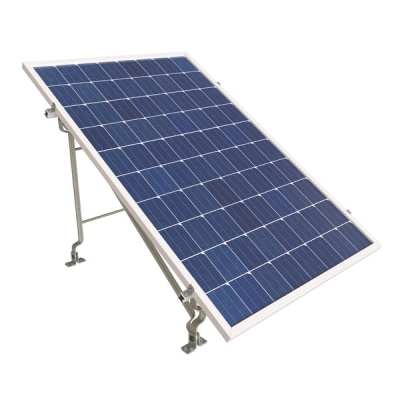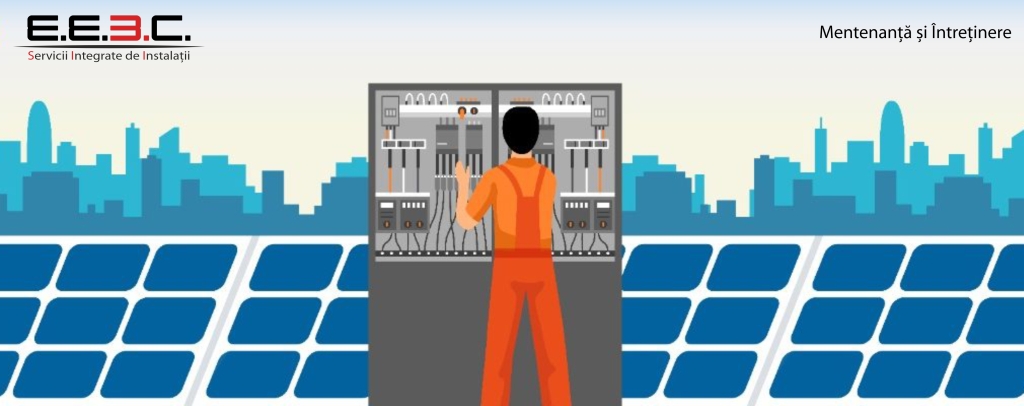Photovoltaic Parks
Design - Construction - Maintenance
East European Business Center E.E.B.C. offers design, construction and maintenance services for industrial, commercial or residential photovoltaic installations.
We offer engineering, procurement, construction, installation and commissioning services for the photovoltaic industry, respectively photovoltaic installations throughout Romania.
The European Union has set itself the goal of obtaining at least 45% of its energy needs from renewable sources by 2030. Some of the most promising renewable sources are solar energy: production of heat and electricity using solar panels.

Solar panels are the most important part of photovoltaic installations

What are solar panels?
Solar panels are groups of solar cells that work together to convert solar energy into thermal energy (solar thermal panels) or electricity (photovoltaic panels). There are solar thermal panels and photovoltaic solar panels.
Solar thermal panels convert solar energy into thermal energy, transferable through the special installation, in the heating system of a given space (house, office, pension, hotel, etc.).
Photovoltaic solar panels are made up of solar modules, and they are in turn composed of photovoltaic cells. They consist of thin layers of semiconductor materials (crystalline or amorphous silicon or aluminum, indium, gallium or selenium), which absorb light and convert it into electricity. The electricity that is produced can be consumed immediately, or, in order not to lose anything, it can be stored in very large capacity batteries, to be used later.
What are the main advantages of solar panels?
- Solar energy is inexhaustible and non-polluting;
- The installation of solar thermal panels, despite the higher costs of initial investment, allows the achievement of considerable savings in the medium and long term;
- Maintenance and operating costs are quite low;
- Surplus electricity produced compared to that consumed can be sold to third parties.
What do photovoltaic installations technically imply?
Photovoltaic installations are composed of the following elements:
- Photovoltaic solar panels (also called "modules");
- An inverter that converts the direct current produced by the panels into 230 volt alternating current (identical to that of the distribution network), which is transmitted to the public electricity network;
- A system wiring and protection system (switches, lightning rods);
- A meter that measures the electricity production of your installation.
What is the productivity of solar panels?
In the case of photovoltaic solar panel systems, the influence of temperature factors will be quite important. In general, when the temperature drops below 20 degrees Celsius or exceeds 30 degrees Celsius, the efficiency of these solar panels will decrease. It is recommended to consult in the technical sheet of the solar panel the maximum power it can provide.
It should be borne in mind that this power can vary slightly from one model to another, but in the case of photovoltaic solar panels, even small differences in values can make a big difference in electricity production.
Such a solar panel can produce up to 500 W and with an energy efficiency of up to 25%. This means that if you want to produce electricity exclusively with the help of solar panels, it is necessary to calculate exactly the amount of energy you need.
How to do the installation and the maintenance of solar panels?
The process of installing and maintaining solar panels must be done by a specialist in the field, because even small mistakes can lead to a malfunction or damage to the solar panel system.
Any solar panel must be mounted in such a way that it has an inclination of 15 degrees, facing south. Thus, the process of capturing the sun's rays will be optimized and the self-cleaning process will be facilitated.

How is the maintenance of photovoltaic panels?
Administrative services:
- Panel cleaning: washing photovoltaic panels in summer, snow and ice removal in winter;
- Vegetation removal;
- Interior road maintenance;
- Checking the drainage system.
Electrical equipment maintenance:
- We perform low and medium voltage circuits.
- We guarantee the verification of panels, cables and other electrical equipment, using the thermal imaging camera.
- We check and report the quality of the energy delivered by the inverter.
- We perform repairs, maintenance and replacement of components or equipment.
Mechanical systems maintenance:
- We check the condition of the surface of the panels, the structural integrity of the equipment, the fencing structures of the locations and the closing-opening and clamping systems of the equipment.
- We intervene quickly for any repair, maintenance and replacement.
- For the washing services of photovoltaic panels we use state-of-the-art equipment.
- The machine used is based on self-propulsion, so it is extremely versatile and can respond to a wide range of situations.
- We identify operating errors in a timely manner, avoiding production losses.
- We help you identify the best and fastest fix solution.
Monitoring and reporting:
- Our specialists carry out regular site visits to monitor maintenance.
- We monitor production 24/24 and offer performance indices.
- We offer real-time notifications and follow-up.
- Monthly and / or annual reporting to customers, banks or other stakeholders. Interpretation and storage of SCADA data.
- We perform budget analysis, production, losses, capacity and performance analysis, wind speed and radiation values analysis.
- We offer recommendations for optimizing operation.

















